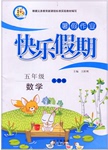题目内容
---We ________ hope you will get a nice result on the National Games.
---Thank you very much.
- A.rapidly
- B.properly
- C.gradually
- D.sincerely
We sincerely hope that…我们真诚地希望……。

 一诺书业暑假作业快乐假期云南美术出版社系列答案
一诺书业暑假作业快乐假期云南美术出版社系列答案Welcome to the Grand Hotel. To make your stay as enjoyable as possible, we hope you will use our facilities(设备)to the full.
Dining-room
Breakfast is served in the dining-room from 8 to 9 a.m. The room staff will bring breakfast to your room at any time after 7 a.m. In this case, please fill out a card and hang it outside your door when you go to bed.
Lunch: 12 to 2:30 p.m..
Dinner: 7:30 to 9 p.m.
Room service
This operates 24 hours. Phone the Reception Desk, and your message will be passed to the room staff.
Telephones
To make a phone call, dial(拨号)0 for the Reception Desk to be connected.
Shop
The hotel shop is open from 9 a.m. to 5:30 p.m.
Laundry(洗衣房)
We have a laundry in the building, and will wash, iron and return your  clothes within 24 hours. Ask the room staff to collect them.
clothes within 24 hours. Ask the room staff to collect them.
Bar(酒吧)
The hotel bar is open from 12 to 2 p.m. and 7 p.m. to 1 a.m.
Banking
The Reception staff will cash checks and change money in many foreign currencies (货币).
【小题1】.
The above service notice can be seen ______.
| A.in a hotel dining-room |
| B.in a restaurant |
| C.in a bedroom of a large international hotel |
| D.at the entrance of a small family hotel |
.You have arrived and stayed at the hotel. It is 11 p.m. and you want a snack (快餐). What should you do?
| A.Go to the hotel shop. |
| B.Go to the hotel bar. |
| C.Hang a message outside your door. |
| D.Phone the hotel shop assistants. |
Which of the following is TRUE?
| A.You can’t have your breakfast in your room. |
| B.You can make a phone call in your bedroom. |
| C.Lunch is served from 12 to 2 p. m. |
| D.You can have dinner at midnight. |
Which is NOT mentioned in this service notice?
| A.Washing clothes. | B.Booking tickets. |
| C.Drinking. | D.Changing money. |
This site contains 100 original short stories about life in America. These stories are written for ESL(English as a second language ) learners who are, at least, high beginners. We want to help ESL students learn English as quickly and effortlessly as possible. Learning should be interesting, not boring. We hope that learners will find that these stories are of some help to improve their English.
The stories have interesting topics and are easy to understand. Each story comes with an audio narrative so that learners can listen as they read. The audio requires downloading the free Real Player. Each story contains a search for pictures, definitions, and pronunciation.“ Following each story are four sets of exercises, and each containing 10 items.
Exercise A is “Yes / No Questions”. The learner is asked questions like, “Does Sara have children?” The learner can then type in, “Yes, she does.” Then the learner can check whether it’s the right answer or not.
Exercise B is “Wh-Questions”. The learner is asked questions like, “Where does Sara live?” The learner can then type in, “She lives in Pasadena.” Then the learner can check his answer.
Exercise C is “Ask Questions”. The learner is given an answer like, “They have two children.” The learner must then type in a question like, “How many children do they have?”The learner can then check to see whether he is correct or not. Exercise D is “Dictation”. The learner listens to a sentence. Most of the sentences duplicate the sentences in the stories. The learner types the dictation and then checks to see whether he is correct or not.
Work on the site is in progress. Help us make it better as the years go by. We welcome all comments, suggestions, complaints, new ideas, and questions. Click here to send us emails.
1.Where does this passage come from?
|
A.A newspaper. |
B.A magazine. |
C.A website. |
D.A research report. |
2.The main purpose of this passage is to _____.
|
A.tell English learners how to do exercises |
|
B.ask the readers to help them improve the site |
|
C.give a brief introduction of an English learning site |
|
D.teach you how to download English articles |
3.All of the following statements are correct EXCEPT _______.
|
A.the learners can listen to a story while reading it |
|
B.there are pictures, definitions, and pronunciation, as well as exercises followed |
|
C.new ideas and suggestions are welcomed |
|
D.the stories are suitable for learners of different levels |
4.If you want to improve your listening ability, you may mainly do some practice in _____.
|
A.Exercise A |
B.Exercise B |
C.Exercise C |
D.Exercise D |